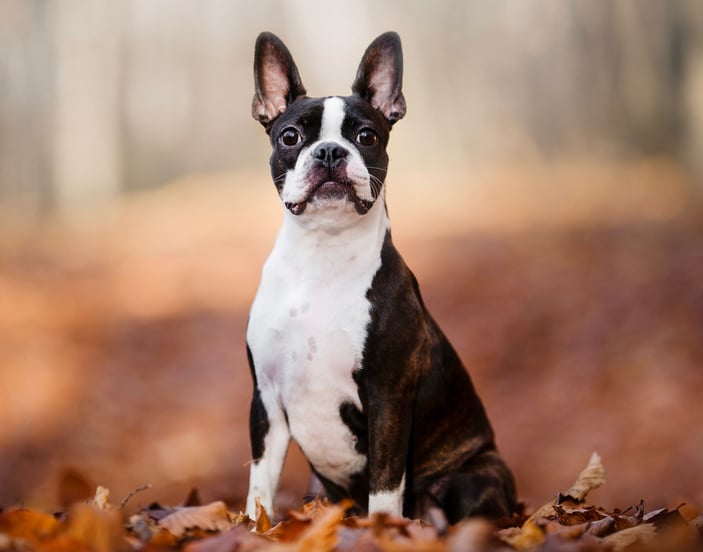The guide to owning a Boston Terrier.
Want to know everything there is to know about training your Boston Terrier puppy? Submit your email below, and we’ll send you a one-stop guide on all things puppy training!
Jump to:
Stats at a glance.
A history of Boston Terriers.
Let's look at the cheeky, funny, and playful Boston Terrier. This dog breed has roots in the late 1800s, emerging from crossbreeding the Bulldog and an English White Terrier.
They earned the nickname "American gentleman" because of their dashing tuxedo style.
Their story began with a dog called Hooper’s Judge who helped shape the foundation of the breed.
By 1893, the Boston Terrier Club of America gained recognition from the Kennel Club in the US, and these compact companions have been a popular breed ever since.
Today, we see Boston Terriers in the non-sporting group, but their past as fighting dogs means they’re spunky and bold.
They might look like little Bulldog relatives, yet they have a unique lineage that blends loyalty, wit, and comedic charm.
Some Boston Terriers are small while others are slightly bigger, but all share the same witty nature.
Want to learn more about unusual breeds in general? Feel free to check out our guide to rare dog breeds.
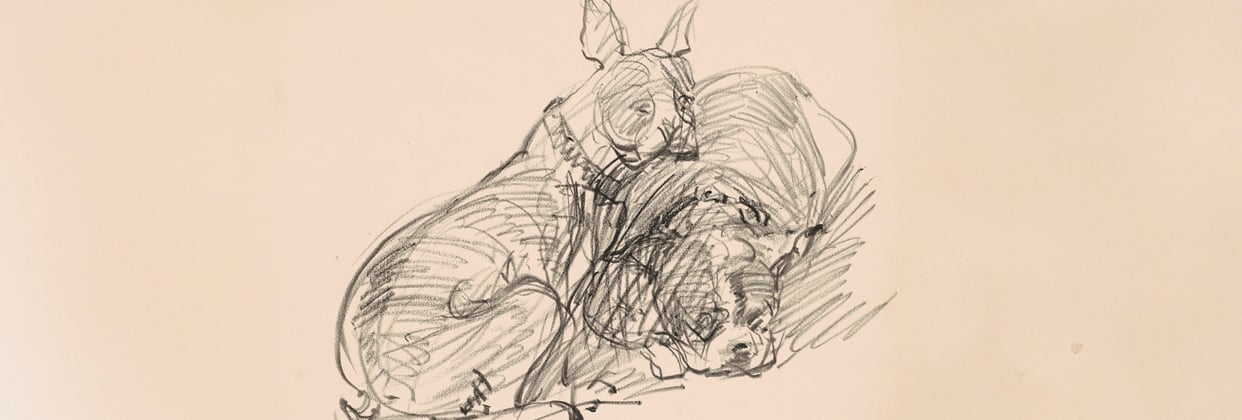

How much is a Boston Terrier puppy (UK)?
If you’re considering adding Boston Terrier puppies to your home, you might find prices range from £1,100 to £2,000 in the UK.
Costs depend on breeder reputation, breed standards, and those striking white markings or brindle coats.
When choosing a Boston Terrier breeder, look for proper health checks, a caring environment, and a genuine interest in matching you with the right pup.
If you’re exploring first-time dog ownership, our tip is to research thoroughly and meet both parents if possible. This helps you get a feel for your future companion’s temperament and potential health.
Colours and coat types.
Boston Terriers have a smooth coat that’s most famously brindle and white or black and white. This polished look helped them earn the "American gentleman" label.
Other variations can include seal and white, or sometimes chocolate tones. The important part is the sleek finish and neat marking around the face and muzzle.
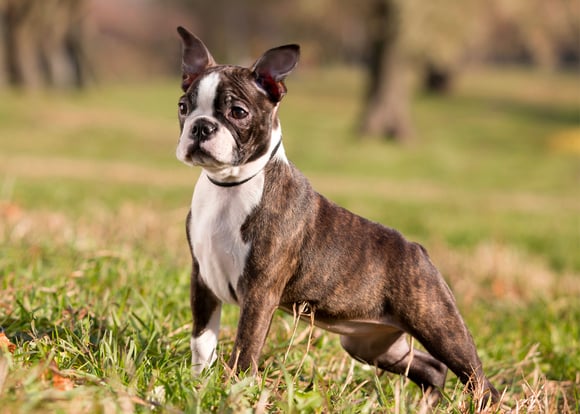
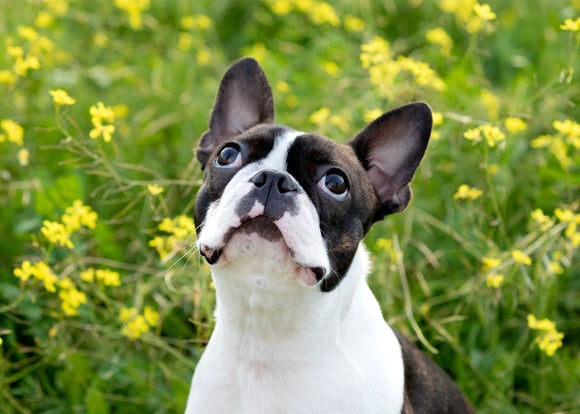
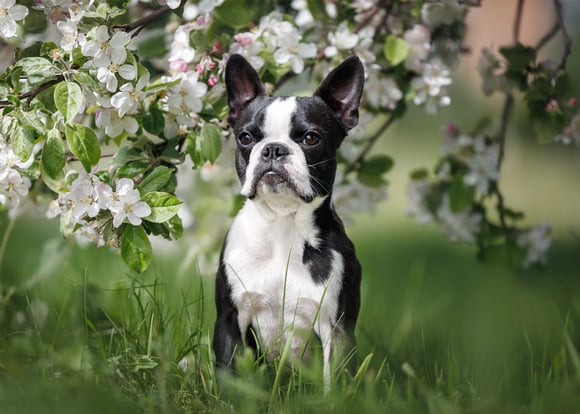
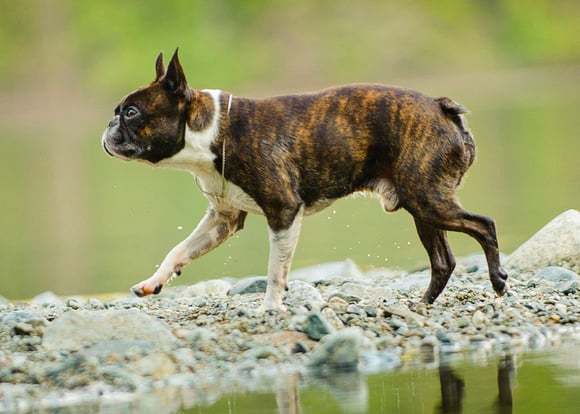

Size and weight.
While Boston Terriers are small, they can still look quite sturdy. Males and females usually fall between 6-11 kg.
Their height is about 38-43 cm at the shoulder, though some lines produce even smaller or larger Bostons. A compact flat face and erect ears are hallmarks of this sweet companion animal.
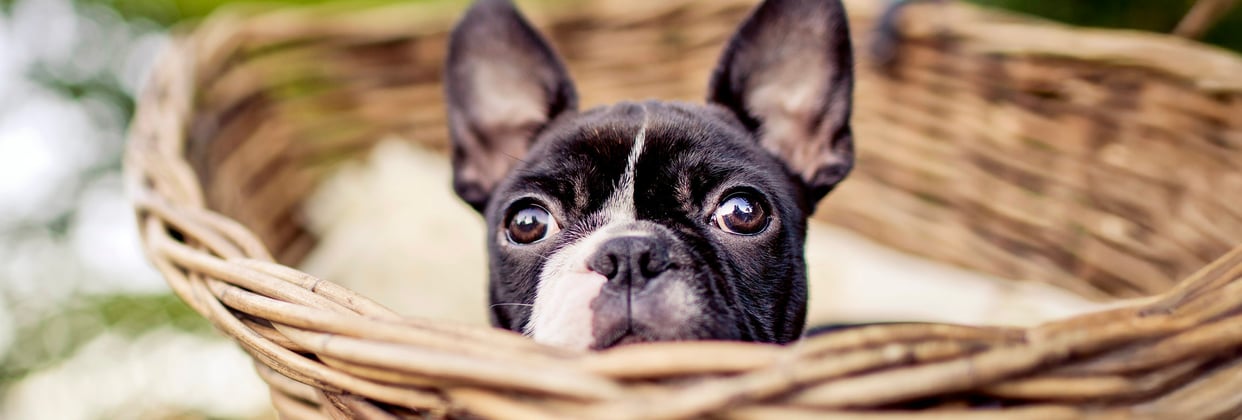

Temperament and behaviour.
Do Boston Terriers make good pets?
Yes. The Boston Terrier dog breed has a lively and affectionate personality that makes it a favourite among city dwellers and families alike.
These little dogs are curious and sociable, always eager to greet you with a wagging tail and a charming grin. They’re typically easygoing but can show their feisty side if not trained and socialised.
Are Boston Terriers good with kids?
Most Boston Terriers are generally patient, playful, and quite good with children. Because of their comedic nature, they often enjoy gentle playtime.
We do suggest supervising younger kids, simply so they learn how to handle a Boston Terrier’s round eyes and short muzzles with care.
If you want more insight on choosing the right family pet, take a peek at our guide to the best family dogs.
Are Boston Terriers good with cats?
They’re typically friendly if introduced in a calm and positive way. The Boston Bull does have some Terrier dogs in its lineage, so early socialisation is key to forging a solid dog-cat bond.
Some prefer being the only pet, but others happily share space with a confident feline friend.
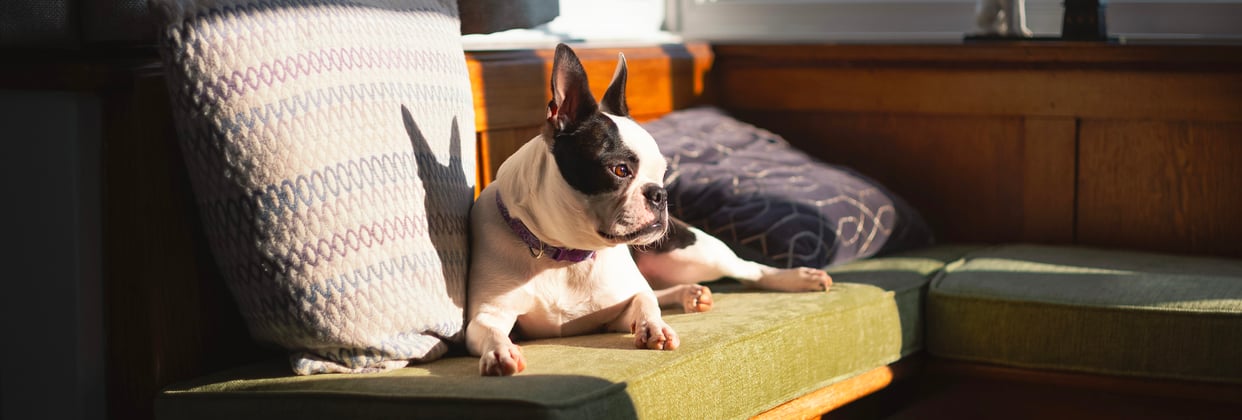

Do Boston Terriers suffer from separation anxiety?
These social creatures bond strongly with their owners. That can sometimes lead to anxiety when left alone for long stretches.
If you’re worried about anxiety, our separation anxiety guide explores ways to keep your dog relaxed and content.
Can Boston Terriers be left alone?
Boston Terriers can manage a few hours solo if they have toys, a comfy spot, and perhaps a midday visit from a friend or dog walker.
Leave them with some mental stimulation, but try not to make extended isolation a habit. They like being with their humans.
Can Boston Terriers live in apartments?
A Boston Terrier is a lively but adaptable pet. They do well in flats, especially with short daily walks. They’re not huge barkers, as we mention below, which is helpful if you have neighbours who enjoy a bit of peace.
Do Boston Terriers bark a lot?
They usually aren’t known for incessant barking. However, some Boston Terriers are more vocal than others. Training from puppyhood can help channel their alert nature so it doesn’t become noise.
Training a Boston Terrier.
Are Boston Terriers smart?
They are clever but can be occasionally headstrong. Patience, positive reinforcement, and fun sessions keep them eager to learn. To build good habits early, you might want to check out our puppy training tips.
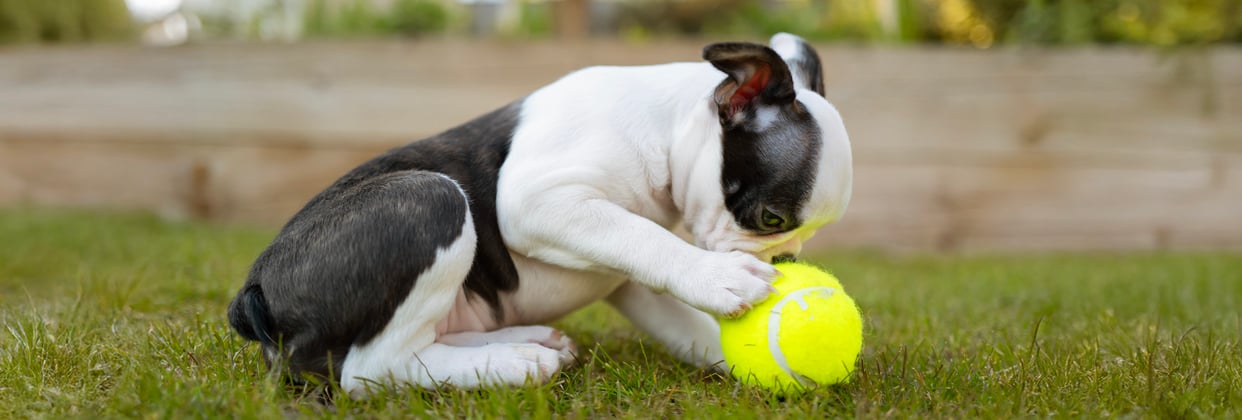

Shedding and grooming.
Boston Terriers have a smooth, short muzzled coat that needs only moderate grooming. A weekly brush or quick wipe keeps them tidy.
Watch out for eye injuries, especially because they have round eyes that can be more exposed.


Exercise and mental stimulation.
A daily 30-60 minute walk or active game is perfect for most Boston Terriers. Short sessions of fetch or puzzle toys help them stay mentally sharp.
Just keep an eye on brachycephalic dogs like these in hot weather. They can suffer from the condition brachycephalic airway syndrome (BOAS), which can make it harder to regulate temperature.
Not sure how to spice up your daily routine? Try these ideas:
Nose work or treat-finding games
Short walks with time to sniff around
Interactive toys
Here’s a simple resource on how to make your dog happy if you’re looking for more ideas.


Feeding and nutrition.
Quality dog food is crucial for your Boston Terrier. They enjoy mealtime, but portion control keeps them from gaining excess weight.
A typical adult might need 1-1.5 cups of balanced kibble per day, divided into two meals. If you’re curious about wholesome options, you can check out our ultimate guide to fresh dog food.
Common health issues in Boston Terriers.
Just like any breed, Boston Terriers are prone to certain potential health problems. Below is a quick look at what to watch for, along with approximate costs:
Note: Costs are approximate and can vary based on location and specific veterinary practices.
A good vet might also watch for breathing difficulties, or other upper airway concerns these flat-faced dogs can suffer from. Early check-ups with health schemes can reduce surprises later.
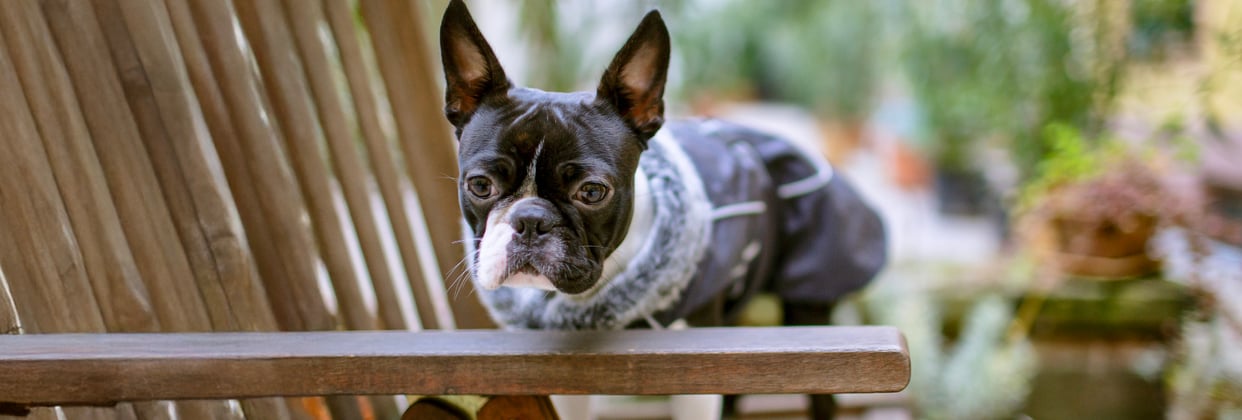

Pet insurance for Boston Terriers.
Because the breed may face health concerns, having coverage gives you peace of mind. Vet bills can add up if your Boston Terrier develops airway issues, eye problems, or something like Cushing’s syndrome.
A good policy will also cover accidents and any breeds like them that share health and welfare concerns.
We recommend exploring Boston Terrier Pet Insurance to protect your companion from hefty bills. This helps you focus on giving your Boston Terrier the best life possible, no matter what happens.
A Boston Terrier is a happy-go-lucky friend in a small, smooth-coated package. With a little care for breathing difficulties, thoughtful training, and lots of gentle affection, these loyal dogs can bring warmth to many families.
Their shining personalities are what make them stand out. We hope this guide has helped you understand the Boston Terrier breed and all that comes with it. Enjoy every wag, cuddle, and silly moment with your new friend.
